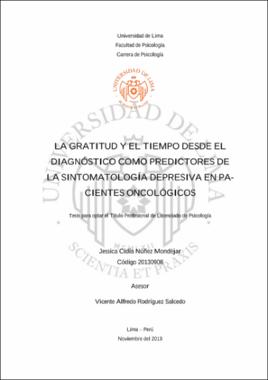| dc.contributor.advisor | Rodríguez Salcedo, Vicente Alfredo | |
| dc.contributor.author | Núñez Mondéjar, Jessica Cidia | |
| dc.date.accessioned | 2020-01-09T23:49:03Z | |
| dc.date.available | 2020-01-09T23:49:03Z | |
| dc.date.issued | 2019 | |
| dc.identifier.citation | Nuñez Mondéjar, J. C. (2019). La gratitud y el tiempo desde el diagnóstico como predictores de la sintomatología depresiva en pacientes oncológicos (tesis para optar el título profesional de Licenciado en Psicología). Universidad de Lima. | es_PE |
| dc.identifier.uri | https://hdl.handle.net/20.500.12724/9996 | |
| dc.description.abstract | This study aimed to explore the extent to which time since diagnosis and gratitude factors
predict symptoms of depression in oncological patients. A total of 133 patients at the National Institute of Neoplastic Diseases were evaluated using a convenience sampling method. The Gratitude Scale by Alarcon and the Center for Epidemiologic Studies Depression Scale (CES D) were used for the evaluation. The results revealed that the Sentimental Feature of gratitude is the best predictor of the Depressive Factor b --.
t ( 2.50, p and Loss of Interest b --. t ( 2.53, p of the
depressive symptomatology. Conversely, time since diagnosis and Moral Duty d o not predict symptoms of depression. Likewise, neither time since diagnosis nor the gratitude factors predict the Diminished Activity of the depressive symptomatology. | en_EN |
| dc.description.abstract | El presente estudio tuvo como objetivo explorar la capacidad del tiempo desde el diagnóstico y los factores de la gratitud como predictores de la sintomatología depresiva en
pacientes oncológicos. Se evaluó 133 pacientes en el Instituto Nacional de Enfermedades
Neoplásicas, empleando un muestreo por conveniencia. Se aplicó la Escala de Gratitud
de Alarcón y la Escala de Depresión del Centro de Estudios Epidemiológicos (CESD).
Los resultados revelaron que la Cualidad Sentimental de la gratitud es la mejor predictora
del Factor Depresivo b --. t ( 2.50, p y Pérdida de Interés b --.
t ( 2.53, p de la sintomatología depresiva. Por el contrario, el tiempo desde
el diagnóstico y la Obligación Moral no predicen la sintomatología depresiva. Asimismo,
ni el tiempo desde el diagnóstico ni los factores de gratitud predicen la Actividad Disminuida de la sintomatología depresiva. | es_PE |
| dc.description.uri | Tesis | es_PE |
| dc.format | application/pdf | |
| dc.language.iso | spa | |
| dc.publisher | Universidad de Lima | |
| dc.rights | info:eu-repo/semantics/openAccess | * |
| dc.rights.uri | https://creativecommons.org/licenses/by-nc-sa/4.0/ | * |
| dc.source | Repositorio Institucional - Ulima | es_PE |
| dc.source | Universidad de Lima | es_PE |
| dc.subject | Gratitud | es_PE |
| dc.subject | Síntomas | es_PE |
| dc.subject | Depresión mental | es_PE |
| dc.subject | Enfermos de cáncer | es_PE |
| dc.subject | Gratitude | es_PE |
| dc.subject | Symptoms | es_PE |
| dc.subject | Depression, Mental | es_PE |
| dc.subject | Cancer-Patients | es_PE |
| dc.title | La gratitud y el tiempo desde el diagnóstico como predictores de la sintomatología depresiva en pacientes oncológicos | es_PE |
| dc.title.alternative | Gratitude and time since diagnosis as predictors of symptoms of depression in oncological patients | en_EN |
| dc.type | info:eu-repo/semantics/bachelorThesis | |
| thesis.degree.level | Título Profesional | es_PE |
| thesis.degree.discipline | Psicología | es_PE |
| thesis.degree.grantor | Universidad de Lima. Facultad de Psicología. Carrera de Psicología | es_PE |
| dc.publisher.country | PE | |
| dc.type.other | Tesis | |
| thesis.degree.name | Licenciado en Psicología | es_PE |
| renati.discipline | 313016 | |
| renati.author.dni | 72394444 | |
| renati.level | https://purl.org/pe-repo/renati/level#tituloProfesional | * |
| renati.type | https://purl.org/pe-repo/renati/type#tesis | * |
| dc.subject.ocde | https://purl.org/pe-repo/ocde/ford#5.01.00 | |
| dc.identifier.doi | http://doi.org/10.26439/ulima.tesis/9996 | |
| ulima.cat | OI | |



